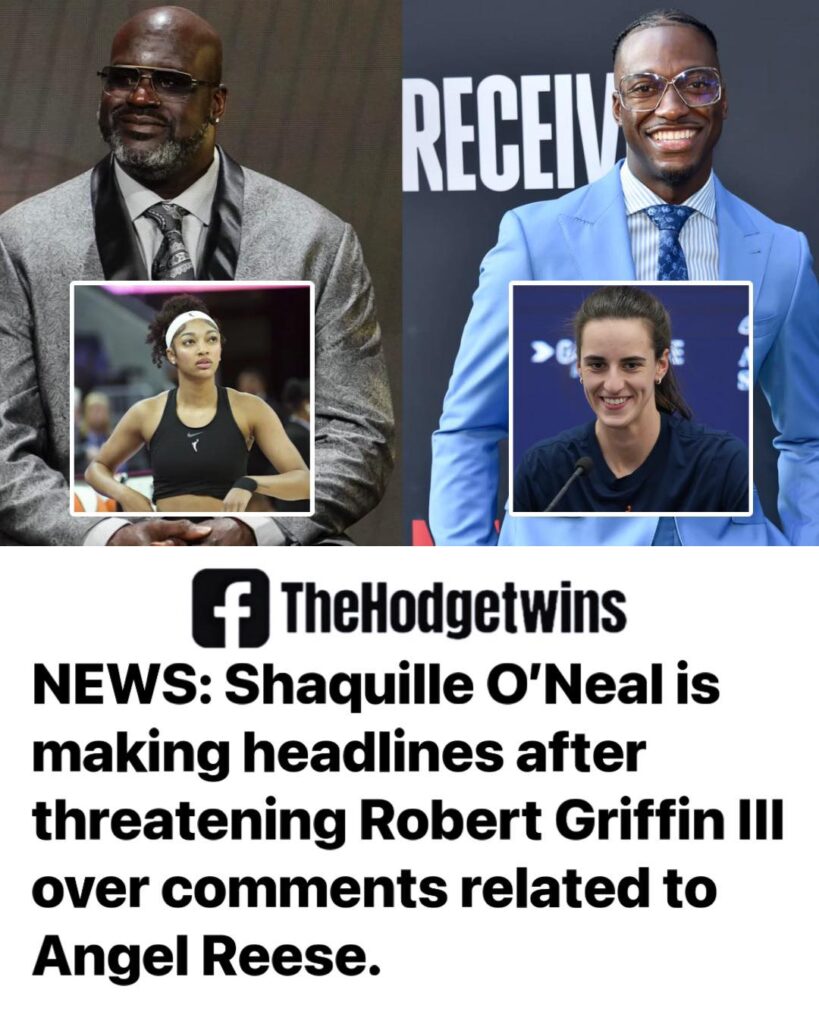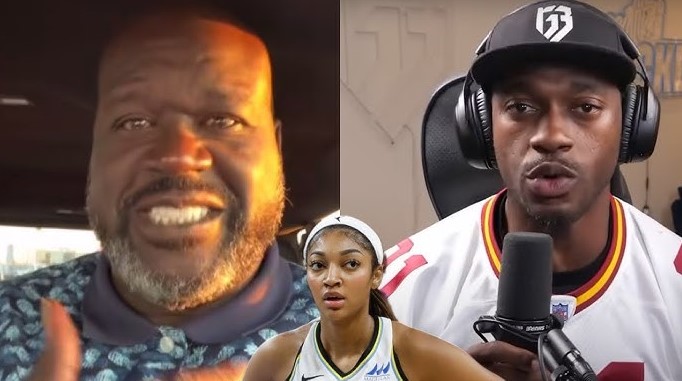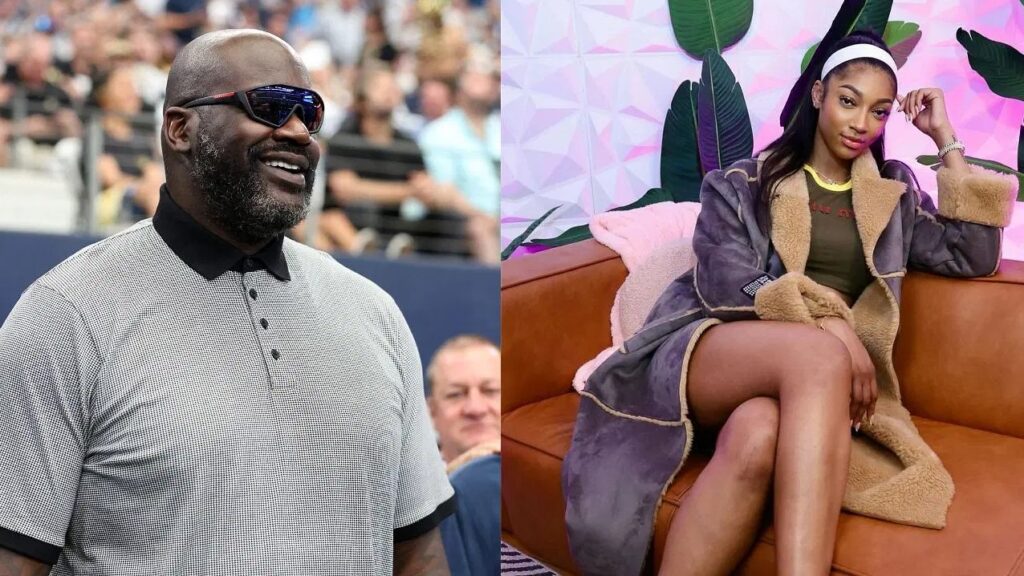In a world where words can go viral faster than truth, and where silence is often mistaken for indifference, Shaquille O’Neal has made it undeniably clear that he will not stay silent when he feels young Black athletes, particularly Black women, are being publicly torn down.

During a recent episode of The Big Podcast with Shaq, the NBA legend did what he’s always done best—speak his mind without filters, without hesitation, and without concern for how the public may interpret his loyalty, especially when it comes to someone like Angel Reese, who has been both celebrated and vilified in equal measure.
It all started with a post by Robert Griffin III (RGIII), the former NFL quarterback turned commentator, who commented on the differing media portrayals of Caitlin Clark and Angel Reese—two rising stars in the WNBA spotlight—suggesting that Reese had been excessively aggressive, and hinting that public tolerance for her actions was somehow unjustified.
On the surface, RGIII’s words might have seemed like a mere sports opinion, but for many—including Shaq—they revealed a deeper bias, a reflection of how the media continues to embrace white athletes with grace and forgiveness, while often depicting Black athletes, especially women, as hostile, emotional, or unsportsmanlike.
Shaq didn’t mince words in his response—in fact, he detonated the conversation like a bombshell, declaring: “Don’t make me get on your a*, RGIII. I will punch you in your f—king face, how about that? Leave Angel Reese alone.”* The quote exploded across social media faster than any box score or game highlight.

He didn’t stop there—Shaq doubled down, calling RGIII a “clown,” and accusing him of perpetuating a toxic narrative that tears down Black athletes under the guise of objectivity, while simultaneously protecting or uplifting white athletes in similar circumstances. And just like that, the court of public opinion was split.
Some viewers were quick to criticize Shaq, stating that threatening physical violence—no matter how rhetorical or hyperbolic—is never the answer, and that such behavior only escalates tension rather than fostering constructive dialogue around the real issues at hand.
But others, especially those deeply familiar with how subtle racism, coded language, and media framing affect Black athletes, argued that Shaq’s outburst wasn’t just justified—it was overdue, a raw and passionate defense against a system that too often devalues Black voices, Black bodies, and Black excellence.
Angel Reese, who has been subjected to relentless scrutiny since her rise in women’s basketball, has become a lightning rod in a conversation that goes far beyond jump shots and rebounds—it’s about who gets grace, who gets judged, and who gets to be emotional without being labeled a “problem.”
When Caitlin Clark shows confidence, it’s called leadership; when Angel Reese does the same, it’s branded as cocky, disrespectful, or “aggressive.” This double standard is not just unfair—it’s harmful, especially to young athletes watching and internalizing these narratives.

Shaq, as one of the few sports legends who has transcended generations, used his platform not just to clap back, but to remind everyone that protecting athletes—especially young Black women—from racialized criticism is a responsibility we all share, not just when it’s comfortable, but especially when it’s controversial.
His message may have been wrapped in the bravado of a heavyweight punchline, but underneath it was a simple truth: defending Black women in sports is not a trend, it’s a necessity, and silence in the face of bias is a form of complicity.
Of course, the internet was immediately ablaze with reaction, with hashtags like #ShaqvsRGIII and #ProtectAngelReese trending across X, TikTok, and Instagram, as fans, pundits, and casual viewers debated where the line should be drawn between protection and provocation.
Some argued that Shaq could have made his point more eloquently, without resorting to threats—others countered that when decorum fails to get attention, disruption often becomes the only language people hear.
What’s ironic is that while the controversy centered on Shaq’s tone, many forgot to address the core of RGIII’s original point, and even fewer reflected on the valid concern embedded in this firestorm: the way society judges women, especially Black women, in sports continues to be glaringly unequal.
In a media environment where outrage often overshadows nuance, Shaq’s outburst may have eclipsed the original debate—but perhaps that’s what needed to happen in order for people to start paying attention.
Because the truth is, conversations about fairness, double standards, and systemic bias rarely go viral—unless they come with a punchline, a power move, or a personality like Shaquille O’Neal behind them.
This incident isn’t just a one-off spat between two former athletes—it’s a reflection of something deeper, something that sits at the intersection of race, gender, media, and power, and how we choose to uplift or diminish people based on who they are and what they look like.
Whether you agree with Shaq’s delivery or not, there’s no denying the urgency of his message, or the passion behind it—because behind the tough talk was a man who’s tired of watching young Black athletes be reduced to headlines, rather than honored for their resilience.
If this controversy does anything meaningful, it should be to reignite a broader discussion about who gets the benefit of the doubt, who gets held to impossible standards, and how much our media narratives are shaped by the unconscious biases we rarely acknowledge.
Shaq may be known for his dominance on the court and his humor off it, but this week he reminded the world of something even more powerful: that speaking out—loudly, messily, and unapologetically—is sometimes the only way to be heard in a world that so often ignores quiet truths.